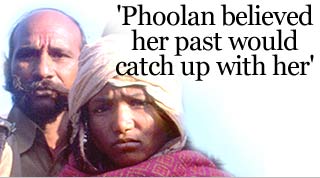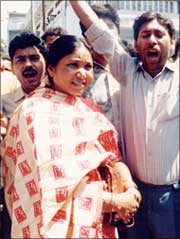The Rediff Special/ Indira Jaisingh

Part I: 'Phoolan deserved a better death'
Phoolan Devi was an amazing woman. When I say this, I'm not glorifying her. I am not saying she was a great woman's libber or an extraordinary human being or a leader or a great role model.
But we should analyse her life in her own context, not in yours or mine. From that point of view, I think she displayed an ability to survive. It allowed her to negotiate her way in a difficult world. She was able to rehabilitate herself even though she had a criminal background and had spent 11 years in prison.
In most societies, once a person becomes a criminal, he is branded for life. But Phoolan crossed that hurdle. I am not aware of a Phoolan Devi in any other country of the world. There is no comparable phenomenon.
She was aware of this. See how she took the challenge of politics in her stride. She was able to negotiate her relationship with Mulayam Singh and other politicians. She was able to use her past to her advantage. She was intelligent and very conscious of her power. She made a new life for herself and earned the right to sit in the Lok Sabha.
When she won the elections, people started asking how an illiterate person could sit Parliament. At least, she had the guts to face the electorate, unlike others who are nominated but go on to say such things.
Phoolan survived by paying the price for the crime she committed. She survived by surrendering. If she had escaped punishment, there would not have been any story. Then I would have merely thought that she got away, she broke the law. But here is a person who paid the price for breaking the law. I definitely admire that.
She killed Thakurs of Behmai. I will not criticise what she did. At the same time, I do not advocate murder. Killing someone does not change people's mindsets. All that happens is that, today, there is one Phoolan Devi; tomorrow, there will be another.
 It just so happened that Phoolan earned public notoriety. There are so many women in India who are raped every day of their lives. We don't know what happens to them; we have no idea if they kill their aggressors or whether they are being killed in caste panchayats.
It just so happened that Phoolan earned public notoriety. There are so many women in India who are raped every day of their lives. We don't know what happens to them; we have no idea if they kill their aggressors or whether they are being killed in caste panchayats.
In many ways, I think she transcended the trauma of what had happened to her. In fact, I believe the other obstacles, like poverty and casteism and male chauvinism, must have been even more challenging.
We knew her well. In her personal life, she was very clever. For example, when we went to meet her, we were introduced to her husband. It was quite obvious that she was the dominant partner in the relationship. She was the man in the family. At the same time, she needed her husband because he probably gave her legitimacy in society. For this reason, she took marriage in her stride.
It was not a big issue with her. Her attitude had nothing to do with feminism or chauvinism. It's just the way she was. Even though she was short-tempered, she was actually a family person. The first few times we visited her, everybody was there -- her mother, her sister, her brother-in-law, her sister-in-law. The house was full. But she was the dominant presence.
Her ability to survive made her a brand name. She was invited to address students and academicians in a number of universities in the United States of America.
I think she hated men but she never boycotted them. She knew how to use them for her benefit. I am 100 per cent sure that the men from her past killed her. They never acknowledged the fact that she spent 11 years of her life in prison and paid the price for her crimes. They believed that, since she had killed their people, she should punished by them and not by the courts.
Their attitude is so cruel. She didn't deserve to die this way.
At some level, Phoolan believed her past would catch up with her, particularly since she was a woman. She knew she had challenged their masculinity. That is why she always demanded police security. She knew her life was in danger; that she could be killed any time. At some level, it makes you identify with that woman's struggle, her pain.
Although I haven't seen her for many years, I can still identify with her. When I heard she had been killed, I felt I had lost a friend.
Part I: 'Phoolan deserved a better death'
Indira Jaisingh spoke to Sheela Bhatt.
Design: Dominic Xavier
You might also like to read:
Full coverage: The Phoolan Devi murder
The Rediff Specials